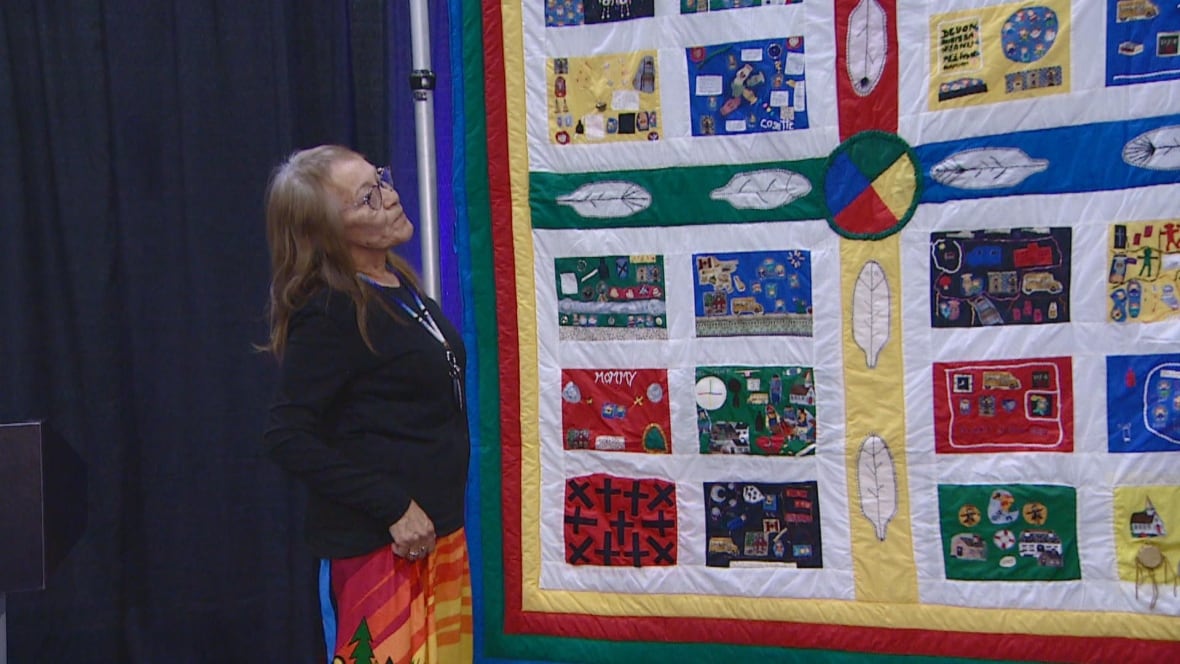Warning: this story contains discussion of residential schools and abuse.
At first glance, the talking quilt is a large blanket rimmed with colour and dressed with patches. To Sandra Head, it “was, and is, a vessel of healing.”
Head is a member of the Peter Chapman Band, which falls under the umbrella of James Smith Cree Nation. She was among a group of about 15 women from James Smith who sewed the talking quilt and opened up to each other as they did.
It became known as the talking quilt because the women shared their experiences with each other, including about residential schools. For some of them, it was the first time they talked about their painful experiences, Head said.
The blanket was passed to Saskatchewan Polytechnic during a presentation at the school’s gym Thursday afternoon.
“It was very difficult at times when we were making this quilt,” Head said to a room full of people.

After a pause for tears, and comforting words from people who hurried to the stage, she continued.
“It was difficult for a lot of us because we had to talk about our experiences in the residential [school] and how it affected all of us when we were making this quilt,” she said. “We cried, we laughed, we shared stories.”
Many of the quilt’s patches are references to residential schools, Head said. Each object represents something in one of the women’s lives at the schools.
One symbol represents a woman’s abuser. Another patch of a chair represents her ability to finally rest.
More than 150,000 First Nations, Métis and Inuit children were forced to attend church-run, government-funded residential schools between the 1870s and 1997.
The schools aimed to assimilate Indigenous children while eradicating Indigenous languages and cultures, and there was widespread abuse.
Head said she and her siblings were taken to residential schools in 1965 and she was forced to attend for seven years.
James Smith Cree Nation Chief Kirby Constant said the nation’s women are the heart of its people.
“Let us wrap ourselves in their wisdom, their teachings and their love, just as we wrap ourselves in the warmth of this quilt,” he said.

Eileen Zaba, from the Saskatchewan Polytechnic psychiatric nursing faculty, met Head during a research project that centred around developing a framework for critical incident response for rural and remote Indigenous communities.
The project involved James Smith Cree Nation, and Head agreed to be interviewed and contribute. That’s when Zaba and Head talked about the quilt and providing it a new home.
It will be displayed at the school’s Saskatoon campus. Head hopes that people who see the quilt will understand the experience of Indigenous people who went through residential schools.
Lindsey Boechler, a researcher with the school’s Centre for Health Research, Innovation and Scholarship, said research is about relationships and is meant to be done with communities, not about them.
“This talking quilt is more than just fabric and thread, which is obvious today,” Boechler said.
“Each square on this quilt carries a story. Not just of hardship, but perseverance. Not just of pain, but of the unwavering determination to reclaim voice in history. That’s what you’re doing, ladies.”
Support is available for anyone affected by their experience at residential schools or by the latest reports.
A national Indian Residential School Crisis Line has been set up to provide support for survivors and those affected. People can access emotional and crisis referral services by calling the 24-hour national crisis line: 1-866-925-4419.
Mental health counselling and crisis support is also available 24 hours a day, seven days a week through the Hope for Wellness hotline at 1-855-242-3310 or by online chat at www.hopeforwellness.ca.
#Quilt #sewn #stories #residential #school #survivors #passed #Sask #Polytechnic












Leave a Reply